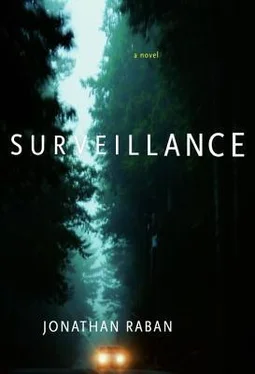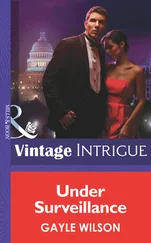The nearest person to a friend she had on the island was Svetlana, the henna-haired Russian who drove over from Langley twice a week to help keep the house tidy. But Svetlana’s English was often impossible to understand, she spoke far more than she listened, and she loved to offer Minna her opinions about “Americans.” Americans didn’t look after their old people; Americans spoiled their children; Americans cared only about money…Svetlana had been living in this country for two years, and talked angrily about going back to Russia, where, she said, “they treat me like queen.” Minna, of course, was locked out from the conversations she had with Augie in Russian, though she sounded so much gentler and nicer than she did in her hectic, threatening, arm-waving English. Augie made her laugh, and she’d never once laughed with Minna, so she really was his friend, not hers.
Minna stooped on the path to pick a dozen leaves from a clump of wild chard, just enough for supper that night. She looked forward to having company for the weekend. Students had healthy appetites. For dinner on Friday, she’d make a rocket salad with beet, orange, and walnuts, followed by a rack of Whidbey Island lamb. Blackberries she’d canned in September stood waiting in Mason jars on a high shelf in the utility room, and she could give them a nice cobbler for dessert.
FINN WAS UP to something — Alida was sure of it. She watched him in Humanities, paying no attention to the teacher but secretly scribbling. As he glanced down at his binder, a smirk would steal across his face, quick as a squirrel crossing a street in an undulating ripple of gray. Finn’s writing was notorious. Nobody wanted him on their team for projects because of his regular B minuses and Cs, and peer-critiquing with Finn was murder: he never got what you were trying to say, and his comments always boiled down to “I think it’s stupid.” The only thing Finn could write was code.
“Have you seen Finn?” Alida asked Gail when they headed for lunch.
“Like, the writing stuff? It’s really weird.”
“But what is it?”
“Well,” Gail said, “I think he’s writing mash notes. To me.”
They had to cling to each other for support as they giggled, and Alida had tears of laughter in her eyes when she said, “Oh my God, that’s so egregious!”
ON THURSDAY MORNING, Lucy was seated in the austere ceilingless writers’ room on the ninth floor of the Central Library, skimming through a toppling pile of World War II memoirs. August Vanags looked down at her from the wall that was hung with black-and-white photographs of local authors. His white mustache was trimmed to perfect shape like a piece of fresh-clipped topiary, but the bulgy glare in his eyes made it plain that he’d taken a dislike to the photographer. His military spruceness set him spectacularly apart from the other authors with their unkempt hair, their two-day stubble, their air of having tumbled fully clothed from their beds to face the camera.
To put Boy 381 in context, she’d pulled from the stacks first-person accounts by refugees, soldiers, civilians, Holocaust survivors. None were half as riveting as Augie’s: where he raced, they plodded; where he was light and nimble, they tended to a solemn, leaden weightiness. The more she read of its rivals in the genre, the more certain she became that Boy was a kind of masterpiece. Writing at a sixty-year distance from the war had given Augie an ironic perspective that no one else could match, and the extraordinary speed at which he’d written the book lent to it a dramatic urgency that was missing from these others. There wasn’t a page of Boy on which you couldn’t feel the author driving forward under a full head of steam, and that was part of its mesmeric quality; it infected the reader with what felt like the writer’s own compulsion to find out what was going to happen next.
Less than wholly compelled, she turned the page of Wolfgang Samuel’s German Boy :
We were alone. One wagon, two horses, and five people. The other soldiers had left on their motorcycles once the wagon had been pulled out of the sand. Below us, flames still flickered in some of the village houses. Refugee wagons and several army trucks attempted to enter the burning village. As our wagon crested the ridge, the horses broke into a trot. With no one in front of us to slow our progress, we moved rapidly, and soon saw the last wagon of our reconstituted column ahead of us. We were the last one now, but we were back with our people. What I had thought was a trap had opened and released us. God had answered my prayers and rewarded Mutti’s faith, I thought. The horses pulled steadily. For them, there was no good or bad day; they just did what they were told…
Samuel was pretty good on the whole, but he wasn’t up to Augie’s standard — though this wasn’t the best place in the world to give any book a fair shake. The writers’ room was overlooked from the tenth floor by a metal catwalk serving the glassed-in elevator shafts, and her reading was constantly interrupted by the annoying poing-poing, poing-poing of arriving and departing elevators. Fragments of Spanish conversation drifted down to her, and she found herself half unconsciously trying to translate them. People waiting for elevators on the catwalk leaned on the rail, candidly examining her at her workstation. When she looked up and caught their eyes, they stared straight back, as if they were watching an animal in a zoo: Look, Homo scriberens! “Throw me a banana,” Lucy wanted to call up to them.
So she was glad when her lone tenancy of the room was broken by the arrival of a disheveled-looking, spindle-shouldered older guy in a pink baseball cap that was too young for him. Like most of the authors on the wall, he looked like he needed a long, hot shower. When they traded nods, his face seemed faintly familiar, but she couldn’t put a name to it. He sat at a far diagonal away from her and opened a massive, grubby, ring-bound notebook.
Under Augie Vanags’ tetchy gaze, she got back to work, methodically scanning pages, but it was impossible not to be distracted by the behavior of the other writer. Though he had a ballpoint pen in his hand, it never touched the paper. Sometimes he leaned back in his chair, cupping his hands behind his head and staring at the black divider that ran between the workstations. Or else, elbows on the desk, he couched his unshaven chin in his palms and frowned intently into the divider as if it were an ebony mirror. An hour passed, then another. So far as Lucy could tell, he didn’t write a word. What was he seeing in that black? His furies?
Shortly after noon she got up to go to lunch. Across the street, Tulio’s had an okay bar that served hors d’oeuvres and sandwiches.
Seeing her disengaged from her books, the man said, “Isn’t this a weird place? It’s like living inside one of those trick architectural drawings by M. C. Escher.” He had an accent — Australian or British — and he was right about Escher. From the writers’ room, Rem Koolhaas’ many-angled lozenges of glass and steel looked like an insoluble puzzle of colliding perspectives.
“Yes, isn’t it?” she said, looking up, dizzied by the diaphanous zigging and zagging of the library roof.
“I like it here.”
She saw that his open notebook contained a few short lines, written in an untidy, spidery scrawl. Poetry? “So what are you w-w-working on?”
“Oh, I’m not exactly working. I just like to bring my block up here and look at it. It gets one out of the house.”
For a moment it crossed her mind to ask if he wanted to join her at Tulio’s, but his aura of gloomy pathos, combined with his unwashed look, made him too unpromising a companion for even a very short lunch. “Well, good luck,” she said.
Читать дальше












